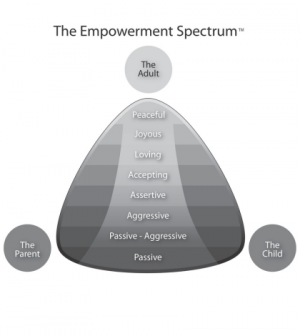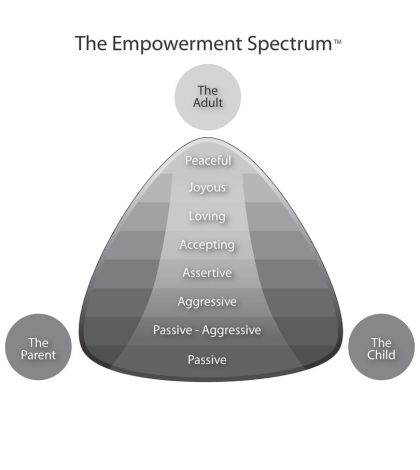- Finding Unshakable Power in a World That Wants to Pull Us ApartPosted 2 weeks ago
- What could a Donald Trump presidency mean for abortion rights?Posted 2 weeks ago
- Financial Empowerment: The Game-Changer for Women in Relationships and BeyondPosted 2 months ago
- Mental Health and Wellbeing Tips During and After PregnancyPosted 2 months ago
- Fall Renewal: Step outside your Comfort Zone & Experience Vibrant ChangePosted 2 months ago
- Women Entrepreneurs Need Support SystemsPosted 2 months ago
Empowerment: Unlocking the Power of Assertive Communication

By Crystal Andrus Morissette
As the founder of Empowerment Coaching, I want to explain what empowerment means to me and why I believe it’s essential for all human beings to understand that becoming empowered can transform many areas of our lives in such a powerful way.
At its core, empowerment equals choice. It means having the confidence, courage, and capacity to express needs, make strategic decisions, and advocate for oneself. Empowerment is a transformative concept that touches every facet of our lives, including our health, wealth, relationships, and professional success, but mostly empowerment is a deep dive into the internal conversation we’re always having about ourselves.
When we are empowered, we’re more able to access a broader range of perspectives, to see things from different viewpoints, and we’re better equipped to deal with challenges. We are able to feel connected and present with our truth and to engage with others from a place of fairness, neutrality, and reason. We care about creating a win-win.
One of the most vital components of empowerment is communication—specifically, empowering communication. Assertive communication, and the levels beyond it, are central to healthy and productive interactions. Empowering communication is respectful, clear, and balanced, where both parties feel heard and valued.

The Empowerment Spectrum is a powerful visual representation of how we show up in the world; I call it our “Emotional Age.” Regardless of our chronological age, we all have an Emotional Age, and the way we communicate often reveals it best.
(Note: In this article, we will focus only on The Communication Scale that runs up the center of The Empowerment Spectrum, and next time, we will look at the three Dominant Archetypes: The Parent, The Child, and The Adult.)
What Is Empowerment?
In my work on Emotional Age, I created The Empowerment Spectrum as an essential tool to understand how our communication style directly reflects and impacts our empowerment levels.
Empowerment is the process of becoming more powerful or more of your Real Self, which ultimately makes you feel more confident, particularly in controlling your life and claiming your rights. It is not about power over others but power within oneself.
Empowerment allows individuals to:
- Recognize their intrinsic value: Know that they are worthy, capable, and deserving of respect.
- Take action: Move forward in life with intention and purpose (but only once they FEEL empowered. We deal with emotions first, strategy second).
- Communicate confidently: Articulate their needs, desires, and feelings effectively.
- Engage with others in healthy ways: Foster relationships based on mutual respect and understanding.
Empowerment is not a static state but a continuous journey, and it’s deeply intertwined with how we speak, think, and act. It enables us to rise beyond fear, insecurity, and passivity, unlocking greater joy, peace, and connection in our lives.
Let’s look at the five ways we communicate, regardless of our gender, age, or culture:
- Passive: At this end of the spectrum, communication is often unclear, timid, or non-existent. Individuals here may avoid conflict or expressing their needs, leading to feelings of being ignored, taken advantage of, or disconnected.
- Passive-Aggressive: This behavior involves indirect expression of anger or frustration. Rather than communicating needs clearly, individuals may resort to sarcasm, withdrawal, or subtle jabs, which can harm relationships over time.
- Aggressive: On this level, communication is loud, confrontational, and often hurtful. Aggressiveness seeks to dominate, blame, or overpower others, leading to defensive reactions and fractured connections.
- Assertive: Assertiveness is the sweet spot for empowered communication. It is direct, clear, respectful, and honest. Assertive communicators express their needs and desires without belittling others or allowing their own voice to be diminished. It fosters mutual understanding and respect.
- Accepting, Loving, Joyous, Peaceful: As individuals move higher on the Empowerment Spectrum, their communication becomes infused with deeper levels of emotional intelligence and compassion. These states transcend assertiveness by incorporating acceptance and love. Communication becomes a source of joy and connection, grounded in inner peace and a sense of unity.
Why Empowering Communication Is Essential
Empowering communication is essential because it allows us to express ourselves authentically while also fostering deeper, healthier connections with others. When we operate from a place of empowerment, we are better equipped to:
- Set healthy boundaries: Being assertive means knowing how to say “no” when necessary, preventing burnout, and protecting our emotional well-being.
- Resolve conflicts effectively: Empowering communication enables us to approach conflicts with clarity and a willingness to listen and collaborate.
- Build trust and respect: When communication is clear and respectful, it strengthens relationships—whether personal or professional.
- Foster personal growth: Empowering communication promotes self-awareness, confidence, and emotional intelligence, all key factors in personal development.
In contrast, when individuals operate from the passive or aggressive ends of the spectrum, they may find themselves in toxic cycles of miscommunication, frustration, or disconnection. In the long term, this can erode confidence and weaken relationships.
Assertive Communication: The Gateway to Empowerment
Assertive communication is a skill that every person should develop to cultivate a life of empowerment. It acts as the gateway to higher levels of emotional intelligence and well-being. By embracing assertiveness, individuals:
- Speak their truth without guilt or apology.
- Listen actively and openly to others.
- Negotiate and find common ground without compromising their values.
- Stay calm and composed in challenging situations.
Assertive communication allows us to avoid the extremes of passivity and aggression, which can either suppress our needs or damage relationships. Instead, assertiveness creates space for healthy, constructive dialogues that honor both ourselves and the other person.
Higher Levels of Communication: Acceptance, Love, Joy, and Peace
Beyond assertiveness lies even deeper levels of communication, where interactions are not just respectful but infused with positive energy. When individuals operate from a place of love, acceptance, joy, or peace, their communication becomes a healing force. Conversations transcend transactional exchanges and become opportunities for growth, connection, and healing. These higher levels represent a state of emotional freedom where fear and judgment no longer dictate interactions.
Imagine the impact of communicating from a place of peace: the calm and presence it brings to every word, the way it diffuses tension and opens hearts. Or consider the power of speaking from joy, where every interaction feels like a celebration of connection and shared humanity. Empowerment, in its highest form, turns communication into a vehicle for creating more love and light in the world.
Why Empowered Communication Can Change the World (in the best way!)
Empowerment is not just an internal experience; it is expressed outwardly in how we communicate with others. It’s about creating a world where fairness, reason, and true authentic power reign. It requires us to stay connected to our own feelings, letting our emotions be a guidance system showing us how we’re thinking and processing experiences and if we’re moving further away or toward our needs, wants, goals, and dreams. By staying mindful and aware, we can elevate our lives and the lives of everyone we encounter. In other words, we can light a thousand more torches rather than feeling as though the time must come for us to pass our own.
P.S. To learn more about Empowered Communication and to enjoy a recent event I held with 16 Empowered Women, visit www.swatinstitute.com/SPEAKS-Final-Act
*******
International best-selling author, Emotional Age and communication expert, and women’s advocate, Crystal Andrus Morissette is a worldwide leader in the field of self-discovery and personal transformation. She is the founder of the S.W.A.T. Institute (Simply Woman Accredited Trainer), an empowerment coach certification exclusively for women that is in over 45 countries that she created in 2009. Crystal is the author of five best-selling books, including The Emotional Edge, which has been featured numerous times both at home in Canada and internationally, including Oprah.com. She is certified in sports medicine, nutrition, and yoga. Learn more at www.SWATInstitute.com & www.CrystalAndrusMorissette.com.







